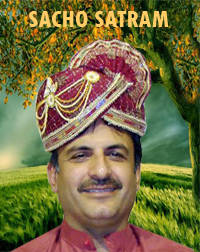Shahanshah Satguru Sai Satramdas Saheb emphasized the importance of maintaining a humble and kind disposition towards others. He advised us to be open to the valuable suggestions and advice offered by our well-wishers. Saijan Said, that Often, we miss out on the opportunity to benefit from the wisdom and guidance of our loved ones when our stubbornness and arrogance deter them from sharing their insights. It’s not ideal when our loved ones simply encourage us to do as we please out of exhaustion from trying to correct us, leading them to stop providing guidance. Therefore, we must avoid reaching that point and actively seek the wisdom in the suggestions our dear ones offer.
Once, a man approached Shahanshah Satguru Sant Sai Satramdas Saheb, expressing his concern about his son’s growing stubbornness and disobedience. He shared with Saijan that the family was deeply distressed by the young boy’s misconduct.Saijan, in his wisdom, turned his gaze to the boy and asked if the father’s account was accurate. The young boy, owning up to his flaws, admitted to having many shortcomings. He confessed to a quick temper, a refusal to heed advice, a tendency to do as he pleased, and a habit of behaving poorly toward others. Saijan then inquired if his elders had attempted to guide him. The boy responded, disheartened, that nobody had made any effort to correct him because he had grown so resistant to advice. In fact, they had resorted to telling him to do as he pleased.
Shahanshah Satguru Sant Sai Satramdas Saheb wisely conveyed that it’s unwise for a person to become so stubborn that others refrain from offering advice. Saijan explained that while it’s acceptable for people not to interfere when we’re on the right path, it’s detrimental when we’re in the wrong and others don’t guide us due to our arrogance. This hindrance obstructs our overall progress and personal growth, impeding our journey to fulfill our life’s purpose.
Paramatma has blessed us with the human experience, and it is our duty to embrace virtuous qualities and uplift ourselves. However, if we succumb to bad habits and mistreat others to the point where no one dares to correct us, it signifies a dangerous transformation from goodness to wickedness instead of the desired personal betterment.
Shahanshah Satguru Sai Satramdas Saheb shared a parable with the boy, illustrating an important lesson. Saijan recounted a story of a family that had a very young child who had just learned to sit up on his own but had not yet mastered crawling.
One day, the family was alarmed to discover a snake positioned right in front of their child, raising its head high. To their surprise, the child was pelting mud at the snake, and the snake was continually lowering its head. The family members were filled with panic, fearing that the snake might harm their child. A brave man stepped forward, claiming to know how to handle snakes, and reassured the family not to panic. He attempted to capture the snake, but the snake swiftly bit him, causing the man to writhe in pain.
Amid this commotion, the child persistently threw mud at the snake, and the snake continuously bowed its head. The story underscores the profound lesson Saijan wanted to convey.
The family members, overwhelmed with worry, began to pray to God. In a moment of uncertainty, a wandering sadhu (a holy person) appeared and instructed the family to remain calm. The sadhu confidently claimed to possess the ability to communicate with the snake. With a sense of serenity, the sadhu approached the snake and initiated a dialogue, asking the snake what was transpiring.
The sadhu conveyed to the family members that the snake had a message for them. The snake explained that it had a karmic connection with the child from a previous life. In that past life, the snake had wronged the child by taking Rs/300 from him and never returning it. Remarkably, the child in that life had never demanded the money back because he understood his inherently wicked nature and its history of wrongdoing.
The snake told the sadhu that because it had not repaid as the child did not forgive him, it had gone through multiple rebirths, with the current life being its third, in which it had taken the form of a snake. This parable serves as a profound reminder of the consequences of our actions and the enduring nature of karma.
The snake explained that upon seeing the child, it had a sudden recollection of the debt it owed from their past life. The child, too, recognized the snake, and although the snake attempted to make amends by repeatedly bowing its head in apology, the child was unwilling to accept the apologies. The child still harbored anger and refused to forgive the snake. Instead, the child continued to throw mud at the snake’s face and insisted that it leave, allowing it to do as it pleased. Despite the snake’s sincere efforts to seek forgiveness, the child remained unforgiving and resolute in asking the snake to depart.
The snake further revealed to the sadhu that it had nothing to offer to repay the child, which was why the child was unwilling to forgive it. This highlighted the sense of helplessness on the snake’s part in making amends for its past wrongdoings.
The sadhu inquired why the snake had bitten the man who attempted to save the child. The snake explained that it had acted out of anger, as it saw the situation as a matter between itself and the child, and it was puzzled why the man had interfered.
Upon hearing this, the sadhu implored the snake to forgive the man and withdraw the venom that had been injected. The snake eventually agreed, stating that it would do so on the condition that the man gave the child Rs 300 on its behalf to settle the debt. The sadhu then asked the man who had been bitten to provide Rs 500 to the child. The man promptly handed over the money to the child, and in return, the snake retracted its venom. Thanks to this act of forgiveness and redemption, the man’s life was spared.
Shahanshah Satguru wisely interpreted the parable to convey a profound lesson. He stressed the importance of leading a conscientious and morally upright life as human beings. It’s crucial to refrain from causing harm to others and engaging in criminal behavior. We should avoid becoming so arrogant that our well-wishers cease to offer guidance and concern. Such arrogance can lead us to be reborn not as humans but in different forms, subjecting us to a cycle of suffering in each new life.
To break this cycle, it’s essential to heed the advice and suggestions of those who genuinely care for us and to humbly seek forgiveness when we err. Being good to people, living a life filled with love, offering blessings, speaking kindly, conducting ourselves with propriety, and consistently earning the love and respect of others is the path to a fulfilling and virtuous existence.
In the wake of Saijan’s profound teachings, the boy humbly lowered himself and sought blessings from the divine presence of Shahanshah Satguru Sai Satramdas Saheb. With sincerity, he implored for blessings that would enable him to forever merit and receive the love and blessings of his dear ones.



